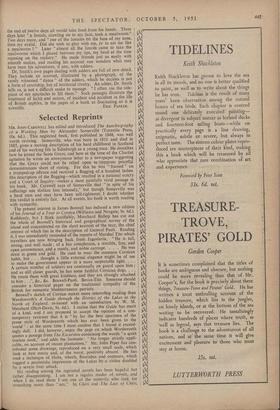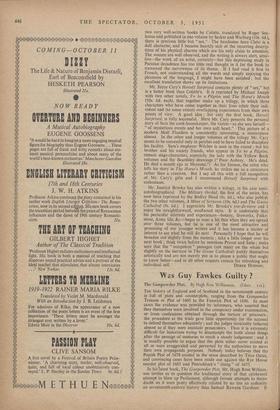Selected Reprints
MR. JOHN CARSWELL has edited and introduced The Autobiography of a Working Man by Alexander Somerville (Turnstile Press, 10s. 6d.). This neglected book, first published in 1848, was well worth reviving. Somerville, who was born in 1811 and died in 1885, gives a moving description of his hard childhood in Scotland and of his working life in Edinburgh as a young man. He describes how he joined the Scots Greys, and how at the time of the Chartist agitation he wrote an anonymous letter to a newspaper suggesting that the Greys could not be relied upon to suppress peaceful demonstrations short of rioting. For this he was " framed " on a trumped-up offence and received a flogging, of a hundred lashes. His description of the flogging—which resulted in a national outcry and a Court of Inquiry—makes a most painfully vivid passage in his book. Mr. Carswell says of Somerville that "in spite of his sufferings one dislikes him intensely," but though Somerville was a hard man and may have been self-righteous, I doubt Whether this verdict is entirely fair. At all events, his book is worth reading with sympathy.
The present interest in James Boswell has induced a new edition of his Journal of a Tour to Corsica (Williams and Norgate, 9s. 6d.). Ruthlessly, but I think justifiably, Morchard Bishop has cut out the whole of Boswell's historical and geographical survey of the island and concentrated on the short account of the tour, the chief interest of which lies in the description of General Paoli. Reading it, I was immediately reminded of the reports of Marshal Tito which travellers are now bringing back from Jugoslavia. "He is tall, strong, and well made ; of a fair complexion, a sensible, free, and open countenance, and a manly, and noble carriage. . . . He was drest in green and gold. He used to wear the common Corsican habit, but . . . thought a little external elegance might be of use to make the government appear in a more respectable light. . . . A certain number of soldiers are continually on guard upon him ; and as still closer guards, he has some faithful Corsican dogs. . . . He treats them with great kindness, and they are strongly attached to him .. .", &c., &c. Boswell-Paoti. Bevan-Tito. Someone should consider a historical paper on the traditional sympathy of the British for romantic Mediterranean patriots.
Boswell's sketch of Corsica makes more interesfing reading than Wordsworth's A Guide through the District of the Lakes in the North of England, re-issued with an introduction by W. M. Merchant (Hart-Davis, 9s. 6d.). I realise that the Guide has merit of a kind, and I am prepared to accept the opinion of a con- temporary reviewer that it is "by far the best specimen of the prose style of Wordsworth which has ever been given to the world " at the same time I must confess that 1 found it exceed- ingly dull. 1 did, however, enjoy the page on which Wordsworth quotes a passage from The Excursion containing the words "a quiet treeless nook,' and adds the footnote: " No longer strictly appli- cable, on account of recent plantations." Mr. John Piper has con- tributed some drawings, reproduced on a very small scale, which look at best messy and, at the worst, positively absurd. He has used a technique of blobs, whorls, flourishes and contours, which suggest a pessimistic impression of the Lakes by a visitor disabled by a severe liver attack.
My reading among the reprinted novels has been hopeful but rather disappointing. I am not a regular reader of novels, and when I do read them 1-am one of the minority who look for something more than "sex." In. Cheri and The Last of Cheri,
two very well-written books by Colette, translated by Roger Sea- house and published in one volume by Secker and Warburg (10s. 6d.), there is precious little but "sex." The handsome hero Chdri is a dull character, and I became heartily sick of the recurring descrip- tions of his physical charms which are his only claim to attention. The women are well observed, and the writing is always alert, sensi- tive—the work of an artist, certainly—but this depressing study in Parisian decadence has WO little real thought in it for the book to transcend the narrowness of its theme. If I had read it first in French, not understanding all the words and simply enjoying the pleasures of the language, I might have been satisfied ; but the excellent translation shows up its limitations.
Mr. Joyce Cary's Herself Surprised contains plenty of "sex," but is a better book than Colette's. It is reprinted by Michael Joseph with two other novels, To be a Pilgrim and The Horse's Mouth (10s. 6d. each), that together make up a trilogy, in which three characters who have come together in their lives relate their indi- vidual and (to some extent) overlapping experiences from their own points of view. A good idea ; but only the first book, Herself Surprised, is fully successful. Here Mr. Cary presents the personal story of Sara the cook-housekeeper, the victim—as she sees herself- " of mysterious events and her own soft heart." This picture of a modern Moll Flanders is consistently interesting, a masterpiece almost. In the other and longer volumes of the trilogy Mr. Cary seems to be successful only in patches and to have failed to discipline his facility. Sara's employer Wilcher is seen in the round ; but his brother and his society friends, who appear in To be a Pilgrim. remain stage-characters, especially the lady with the Yellow Book volumes and the Beardsley drawings (" Poor Aubrey. He's dead. He died a month ago at Mentone.") As for Jimson, the artist who tells his story in The Horse's Mouth, he strikes me as a caricature rather than a creation. But I say all this with a full recognition of Mr. Cary's gifts and I recommend Herself Surprised with enthusiasm.
' Mr. Jocelyn Brooke has also written a trilogy, in his case semi- autobiographical. The Military Orchid, the first of the series, has now been reprinted by the Bodley Head (8s. 6d.), who also publish the two other volumes, A Mine of Serpents (10s. 6d.) and The Goose Cathedral (9s. 6d.). I appreciate Mr. Brooke's joie-de-vivre and I enjoy his straightforward, unaffected style. It is undeniable that his particular interests and experiences—botany, fireworks, Folke- stone, Army life, &c.—begin to wear a bit thin when they are spread over three volumes, but he is one of the most attractive and promising of our younger writers and it has become a matter of interest to see what he will do next. Personally I hope that he will broaden out slightly from the esoteric ; take a little longer over his next book think twice before he mentions Proust and Satie ; make sure that the" outspoken" passages (not many on the whole but slightly on the increase in The Goose Cathedral) justify themselves artistically and are not merely put in to please a public that ought to know better—and in all other respects remain his refreshing and






















































 Previous page
Previous page